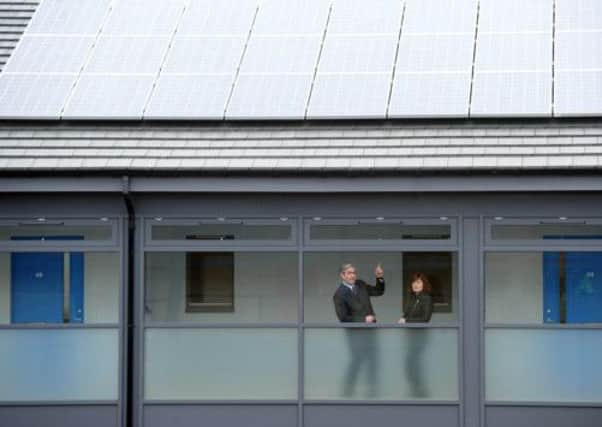Top estate agent: Scots struggling on green energy


Gregory Dix, of Savills Energy, is challenging claims by the Energy Saving Trust that Scotland is on track to achieve its community renewable target of having 500 megawatts of community and locally-owned renewable energy schemes in place by 2020.
Mr Dix said the figures published by the trust relied too heavily on farms and estates, which accounted for 33 per cent of the total, with a further 31 per cent being accounted for under housing association developments and local business developments.
Advertisement
Hide AdAdvertisement
Hide AdAnd he claimed that under the “real definition of community” the total capacity of renewable energy so far installed in Scotland was only 26megawatts.
In its report, the trust revealed a 39 per cent increase in twelve months in “community and locally owned” operational renewable energy schemes - defined as schemes owned by community groups, charities, public bodies, further and higher education establishments, local authorities and housing associations, and local Scottish businesses, farms and estates.
The trust identified a total of over 5,000 individual renewable energy installations capable of generating an estimated minimum of 204 megawatts of renewable energy capacity with a further 647megawatts of community or locally owned renewable energy capacity estimated to be in different stages of development.
Mr Dix, speaking on the eve of the opening of the All Energy renewables showcase in Aberdeen, said: “These are impressive headline figures, but they are slightly muddled when one takes into account the fact that under the real definition of ‘community’ from the report the total capacity installed is only 26 megawatts.
“Community schemes are, in fact, very challenging to set up, particularly while investors are still jittery about long-term returns on energy investments.”
He continued: “They have to work hard to build a case and are often very poor in the scoping and pre-planning stage because of the lack of funds to obtain the right expertise. This explains why, when you drill down into the figures, you find the number of genuine community projects is actually very small.”
Mr Dix pointed out that 167megawatts of the future projects was accounted for by the controversial Viking Wind Farm development in Shetland, partly owned by the Shetland Charitable Trust.
He said: “It remains uncertain whether the project will go ahead as the proposed Shetland to the Highlands interconnector is not likely to be in place before 2018. It is the complex issues of such items as interconnection, lack of faith in Government stance on financial support and the challenges of planning and raising the funding that will always be a limitation on true community energy developments.
Advertisement
Hide AdAdvertisement
Hide Ad“Schemes often fail, because of a lack of initial expertise in early stage scoping and following a proper development programme. This is principally down to a lack of experience and expertise, which can be bought in but at significant cost.”
Meanwhile Aberdeen City Council is warning motorists to allow extra time for their journeys tomorrow as the All Energy event begins at the Aberdeen Exhibition and Conference Centre at the Bridge of Don.
A spokeswoman said: “More than 8,000 visitors are expected to arrive in the city this week to take part in the All Energy event at the AECC. There is likely to be an impact on traffic and the travelling public is advised to allow extra time for their journeys and expect some delays, especially on the main routes into the city.”
This week’s All Energy is poised to break all records set over its 13-show history. A spokeswoman for the event’s organisers said: “The exhibition is bigger than ever before - there are more speakers in more conference sessions than ever before; and pre-event registrations have established new records.There will be 580 exhibiting companies covering 8,000 square metres of exhibition space.”
Speakers include Ed Davey, Secretary of State at DECC, Fergus Ewing, the Scottish Minister for Energy, Enterprise and Tourism, and Professor Sir Jim McDonald, Principal and Vice Chancellor of Strathclyde University.